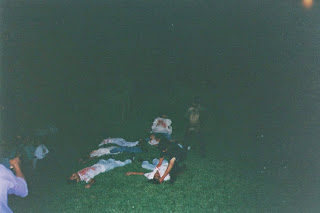 |
| Prayer vigil at the UCA (1997) |
 |
| Re-enactment of the martyrs deaths at the UCA (1997) |
To me, the martyrs—my Jesuit brothers and their companions—provide motivation for the distinctive education that Catholic and Jesuit universities in North America bring to the students we serve in the 21st century.
What all universities claim to teach their students—specifically, to think critically, reason analytically, solve problems and communicate clearly—is necessary, but not sufficient, for Catholic and Jesuit universities. A Catholic and Jesuit university should ask more of its students by educating and forming them to become men and women of faith and of service to their communities.
Jesuit education, animated by the vision of St. Ignatius Loyola and his first companions, applies insights born of St. Ignatius’ Spiritual Exercises. The insights include: “a personal calling that frees us to embrace our truest passions in following Christ and in service of others; the redemptive possibility of self-giving love that invites us to attend to the cries of those who suffer; the experience of enduring goodness that gives hope for a world in which the Spirit always labors.”
One of the key phrases capturing the charism of Ignatian spirituality is “to love and serve in all things.” Here lies the key to Jesuit higher education in the 21st century. For a Jesuit university should ask more of its students by challenging them to make Ignatius’ charge—his notion of service—their own. Jesuit educators can do this by shaping not just what students know, but who they become: men and women of adult faith, of competence, for and with others. This is the Jesuit difference.
But there is a catch here, a shift in educational philosophy: It is not just serving others and learning about people, but learning with and from people who are often excluded from participation in economic, social and political life. And further, the Jesuit difference integrates academic inquiry, creative imagination and reflection on experience that inspires fashioning a more just and humane society. In sum, the 21st century Jesuit university should encourage profound engagement with the real and so commit itself to a pedagogy of active, collaborative, transformative learning about social justice, as an integral part of a liberal education.
To deliver a transformative education in the Jesuit tradition requires the integration of academic, moral and spiritual learning—the union of mind, heart and soul.I love teaching at a Jesuit university where people are committed to these ideals and are striving to make them a reality. The sense of community is really something special. I'm not sure we are there yet but maybe that's just the magis in me.
Today marks the anniversary of the launch of the FMLN's (second) final offensive in El Salvador. The offensive was spectacular but would ultimately fail causing a series of events, including the murders at the UCA, that would ultimately lead to the end of the war and the signing of peace accords two years later.
Tomorrow, I head to Fairfield University, my alma mater, in order to participate in a panel discussion on “Celebrating Life and Culture in El Salvador.”
No comments:
Post a Comment